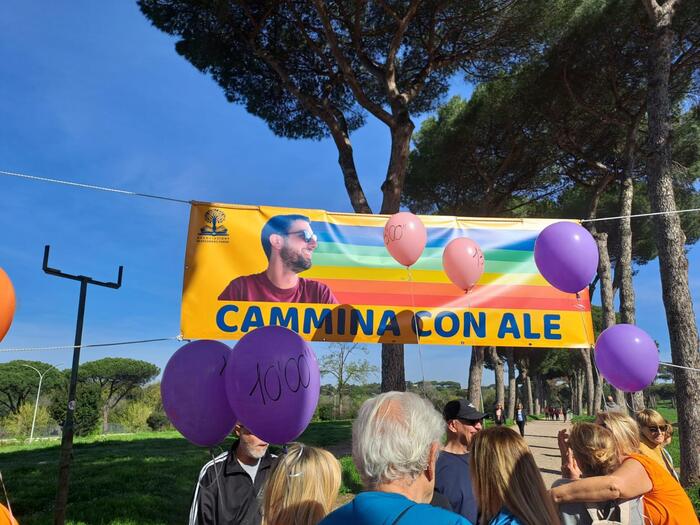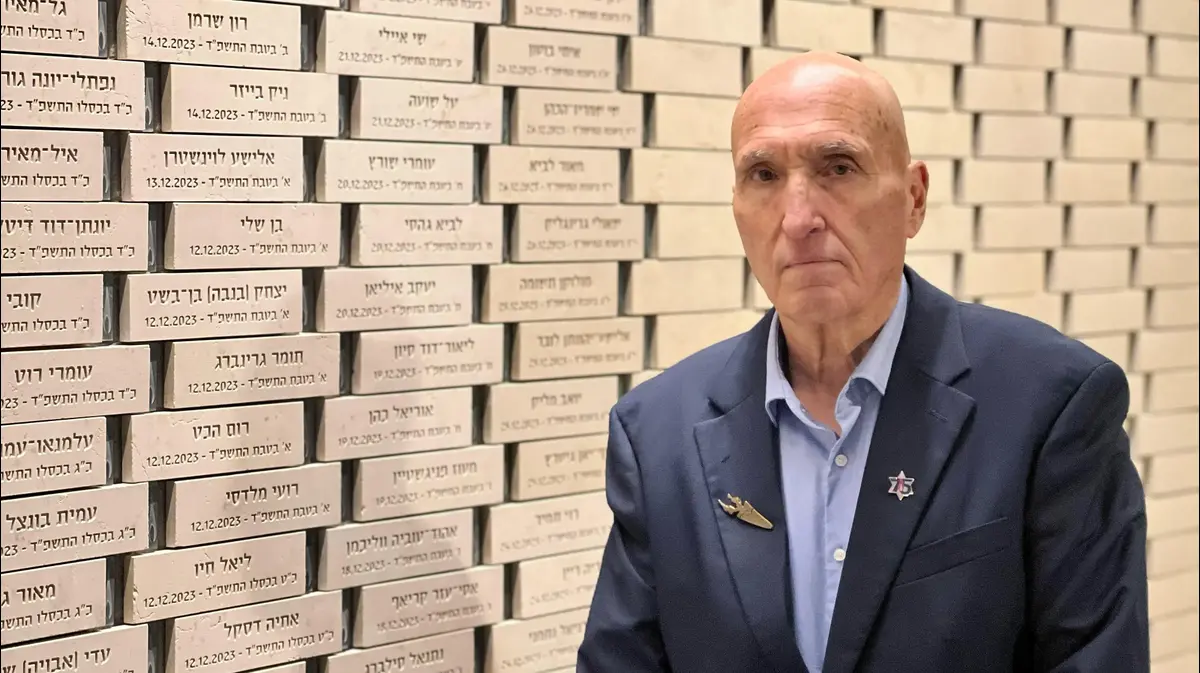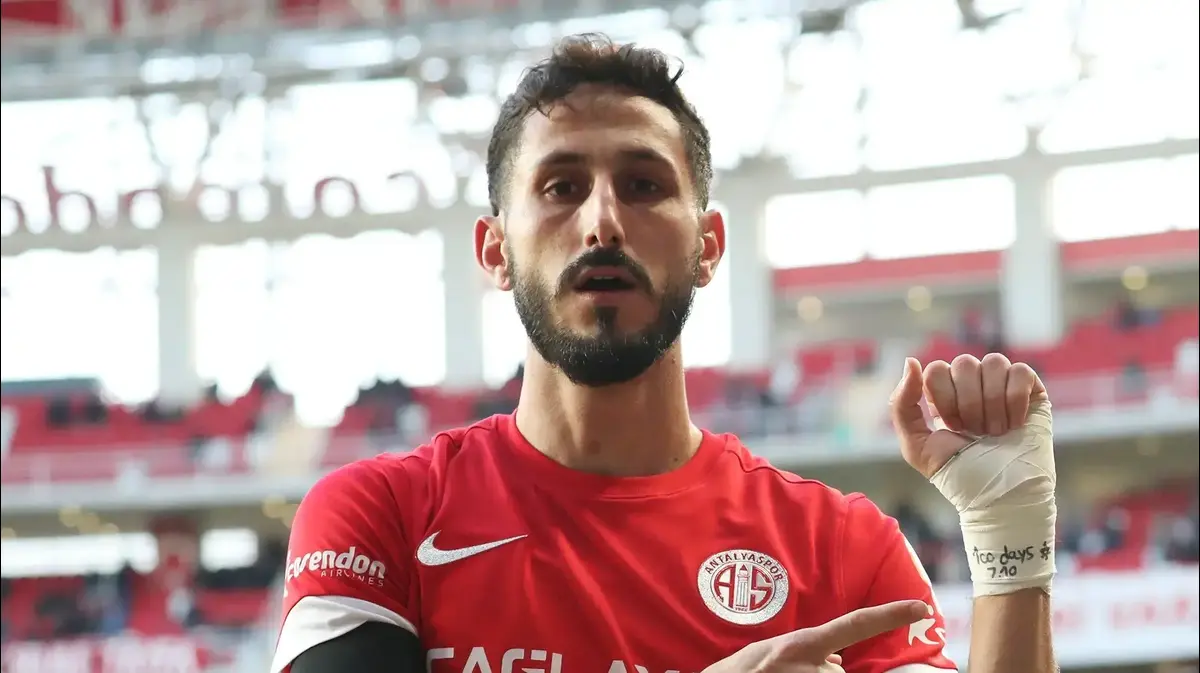Enlarge image
The repatriation of the bodies on Oct.
11, 2004
Photo: Yoav Lemmer / AFP
"Where is Christopher?"
– when, at 7 in the morning, the voice wakes me out of a half slumber, 33 years had passed since the last time it had done so.
It's Tzaki's voice.
He has Austrian and Iraqi roots, but in terms of punctuality, he has always been a
Yekke
, as they call the Jewish immigrants from German-speaking countries in Israel.
Thirty three years ago, I spent the 1988-89 school year on an exchange program with the American Field Service (AFS) in Israel.
I spent one year living with the Moria family: father Tzaki, his daughter Neshem, 15 at the time and his son Rotem, who was 12. I was in the 11th grade at Ironi Daled High School in Tel Aviv and learned Hebrew at an Israeli
Ulpan
, a language school for immigrants.
It had been Rotem's idea to host an exchange student from abroad.
He was so happy to have a brother that he even shared his small bedroom with me.
Every morning, Tzaki opened the sliding door to our room and woke us up. "Rotem, Christoph,
nu, kumu kwar
!"
(Get up already!)
We've stayed in touch throughout the years.
Tzaki is now 73 years old.
I wasn't able to visit my family for a long time due to the coronavirus, but in March, I was finally able to fly to Tel Aviv again.
From there, we took a car down to Eilat.
As he does every year, Tzaki invited friends and family to the Red Sea town.
And everybody came – just not Rotem.
So, it's 7 am I drag myself out of bed, put on my running shoes and the green T-shirt that Tzaki gave to me last night.
It's mid March.
The TV is on downstairs.
In the city of Beersheba, an Israeli Bedouin has stabbed four Jewish Israelis right out on the street, and the topic of the news show is the question: How does a person turn into a terrorist?
Slowly, the others start getting up: My host sister Neshem, her three kids, friends.
We're all wearing the same green T-shirt.
It features a portrait of my host brother, together with the Hebrew words: "The 17th Annual Run in Memory of Rotem."
On October 7, 2004, at around 10 p.m., a terrorist drove into the lobby of the Hilton Hotel in the Egyptian city of Taba on the Sinai Peninsula close to the Israeli border.
The bomb tore a crater, and part of the building collapsed, burying people beneath.
Shortly thereafter, two other bombs exploded some 50 kilometers to the south.
All together, more than 150 people were injured and 34 killed, including 12 Israelis.
Rotem was one of them.
When my Nokia cell phone rang on Oct.
9, 2004, my wife and I were standing on the escalator at the Frankfurt exhibition center entering the book fair.
Ronen was calling, my host sister's husband, Rotem's brother in law.
Ronen was worried.
Rotem wasn't answering.
He had gone camping in one of the Bedouin villages on the Sinai Peninsula over the Sukkot holidays with his friend Assaf.
They didn't know anything more yet, Ronen told me.
Later, as we were having dinner in a restaurant near Frankfurt, Ronen called again.
They had possibly found Rotem.
Israeli and Egyptian rescue squads had recovered dead bodies from the destroyed part of the hotel.
The corpses had been transferred to Sharm el-Sheikh on the southern part of the Sinai Peninsula.
Some of the bodies couldn't be identified, and since they had been reported missing, the authorities assumed they could include those of Rotem and Assaf.
Later, it turned out that the two friends had been present at the hotel at the time of the attack only by accident.
They had rented a hut in one of the holiday camps for backpackers on the shore of the Red Sea and had actually wanted to stay longer.
But then their hut burst into flames for unexplained reasons while they were swimming, and their passports got destroyed.
Had Rotem carelessly dropped one of his cigarettes?
In order to avoid getting into any trouble, Rotem and Assaf immediately went back to the Israeli border near Taba.
The Israeli authorities wanted to send provisional documents by fax, and the only fax machine for miles around was located in the nearby Hilton.
So, on the night of Oct.
7, 2004, the two friends walked into the lobby of the hotel.
A short time later, the suicide bomber blew himself up.
Rotem and Assaf could only be identified by their teeth.
The bodies were flown to the pathology department in Tel Aviv with an Israeli army helicopter.
Tzaki wanted to see his son one last time.
The doctors advised him against it, but he insisted.
Every time he recalls this moment Tzaki starts to cry: "They showed me a burned corpse and said, 'This is Rotem'," he says and pauses.
"I kissed him where I thought his head would be."
I didn't make it to the funeral because in the Jewish tradition the dead are buried as almost as possible.
When I finally arrived in Tel Aviv, Tzaki cried, embraced me and said that I was his only son now.
We sat Shiva, and I became aware of this wonderful mourning ritual: You speak about the person who died, share anecdotes, laugh and cry at the same time, and slowly one gets used to the fact that the person whom you loved has left.
I thought about my last meeting with Rotem.
Less than two months earlier, he had attended our wedding near Berlin.
The small, unathletic nag had turned into an attractive young man who drew the attention of women at the wedding party.
After his military service in the Israeli navy, Rotem started in the computer business like so many Israelis.
But he wasn't satisfied with his job, as he told me in our last conversation.
He wanted to do something in the field of the arts.
Filmmaking had interested him as far back as high school.
Rotem loved horror movies.
In high school, he made a short film about two zombies.
He loved Peter Jackson.
And Quentin Tarantino, the master of revenge stories.
Tarantino once said that revenge is a theme in movies, but in real life it is like "getting lost in a dark forest."
"Have you ever thought of revenge?," I asked Tzaki.
"In order to think of revenge, you have to know who is responsible for the deed," Tzaki said.
Several Islamist groups claimed responsibility at the time, and Israel suspected that the terror network al-Qaeda had organized the attacks.
"Did the terrorists want to hit the Egyptian state or did they aim at killing Jews because the hotel was known to be popular among Israelis? We don't know. And it doesn't interest me anymore. My son is gone."
Tzaki says that State of Israel initially didn't want to recognize Rotem and the others as official "victims of actions of terrorism."
In addition to the financial rights that recognition provides to families, the victims of actions of terrorism are also officially remembered once a year together with fallen soldiers on Yom Hazikaron, the Day of Remembrance.
"It is the merit of Ariel Sharon that Rotem and the others were officially recognized," recounts Tzaki.
Sharon had been prime minister at that time: "He didn't care where the attack took place. Israelis had been murdered. That was only thing that mattered, argued Sharon."
After Rotem's death, Tzaki set up a small foundation that provides support for films according to the slogan: "Against all odds."
And every year, he organizes a memorial run.
I participated for the first time this year.
We run from the city of Eilat along the shore of the Dead Sea to the Egyptian border.
After almost an hour, we reach the roundabout at the border station.
Some Israeli backpackers have just entered Israel from Egypt.
After the Hilton attack, many Israelis didn't want to travel to Sinai anymore, but over time it has become a popular destination again.
Once the last friends have reached the finishing line, Tzaki awards each of us a medal.
We all line up in the middle of the roundabout.
In May, a memorial stone will be erected here commemorating the victims of the attack – finally.
Tzaki fought for this for many years.
The city administration of Eilat wasn't interested in a memorial stone.
This would only be possible if the victims were citizens of Eilat, it was said.
This angry Tzaki deeply.
He is not only a
Yekke
, but also a
Nudnik
, as they say in Hebrew: He can get on people's nerves.
He ultimately turned to Nissim Chazan, the head of the border station between Eilat and Taba.
Chazan supported the idea.
And since the roundabout at the border doesn't belong to the city of Eilat, it was only the Israeli Border Crossings Authority that had to be convinced.
The authority recently gave the green light.
Tzaki has ordered a memorial stone that will contain an inscription telling the story of the Sinai attacks and list the names of the 12 Israeli victims.
The memorial is set to be inaugurated in May. Tzaki is now considering who he should invite from the government?
Prime Minister Naftali Bennett?
Or Transport Minister Merav Michaeli?
On my way back to Berlin, in the duty-free area of Tel Aviv's Ben Gurion Airport, I see a tall woman with black hair surrounded by people.
It's Merav Michaeli.
I know her from a German-Israeli exchange program organized by the Bertelsmann Foundation.
Michaelmas was a journalist before she went into politics.
I tell her the story of Rotem and that Tzaki would like to invite her.
"Send me an invitation!"
she says and bids farewell.
After landing in Berlin, I turn on my smartphone and read in the news that Arab terrorists have shot two policemen in the Israeli city of Hadera.








